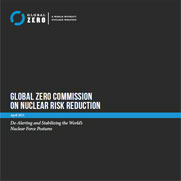
Des Browne
Vice Chair, NTI
We welcome the report released by Gen. (Ret.) James E. Cartwright and the Global Zero Commission on “De-Alerting and Stabilizing the World’s Nuclear Force Postures." We share their view that, “The slope from a crisis to nuclear brinksmanship to escalation to the use of nuclear weapons with cascading global implications is a much too steep and slippery one.”
True progress on reducing nuclear risks — and true cooperation necessary to prevent proliferation and nuclear terrorism — is not possible when both Washington and Moscow remain postured for mutually assured destruction on a planet-ending scale. If leaders fail to see and act on this premise, the U.S. and Russia will remain trapped in a costly and risky nuclear posture — and other nations may follow in their footsteps, making probable that Hiroshima and Nagasaki are not the last cities to suffer a nuclear attack, either by terrorism, a mistake or accident involving nuclear weapons, or a new conflict involving an increasing number of nuclear-armed states.
We agree with Global Zero and many other leaders, former officials and experts that Washington and Moscow have a special responsibility, obligation and experience to demonstrate leadership. In particular, we support the conclusion that the United States should work with Russia and other nuclear-armed nations world-wide to remove all nuclear weapons from the prompt-launch status in which nuclear-armed ballistic missiles are deployed to be launched in minutes. As Sam Nunn and Bill Perry wrote with George Shultz and Henry Kissinger in 2007 in The Wall Street Journal, a vital step in laying the groundwork for a world free of the nuclear threat is, "Changing the Cold War posture of deployed nuclear weapons to increase warning time and thereby reduce the danger of an accidental or unauthorized use of a nuclear weapon.” This would reduce first strike capabilities, improve the assured survivability of forces and increase time for decision-making.
In the United States, we need to seriously consider whether we need to replace every element of today’s triad of strategic nuclear forces — land and sea-based intercontinental ballistic missiles and strategic bombers. In particular, we should seriously examine whether moving toward a dyad could facilitate removing weapons from prompt-launch status and reduce the risks of an accidental, mistaken or unauthorized launch. We also need to ask: Does deterrence require costly modernized tactical nuclear weapons stored in overseas bunkers and new delivery systems for these weapons, and will our NATO allies modernize their own delivery systems?
A global initiative led by the United States and Russia to remove weapons from prompt-launch status would be a solid step forward in a global effort to reduce reliance on nuclear weapons, to prevent their spread into potentially dangerous hands, and ultimately to end them as a threat to the world.
Sign up for our newsletter to get the latest on nuclear and biological threats.
During the 17th meeting of the Global Dialogue, participants developed plans to ensure successful outcomes at ICONS and leverage that momentum to reinvigorate nuclear security internationally.
NTI advanced key principles from a recent report that outlines pathways for the responsible, sustainable, and effective development of new nuclear projects and industries in embarking countries.
Organization founded by NTI works to strengthen the physical protection and security of nuclear and radioactive materials and facilities worldwide.



